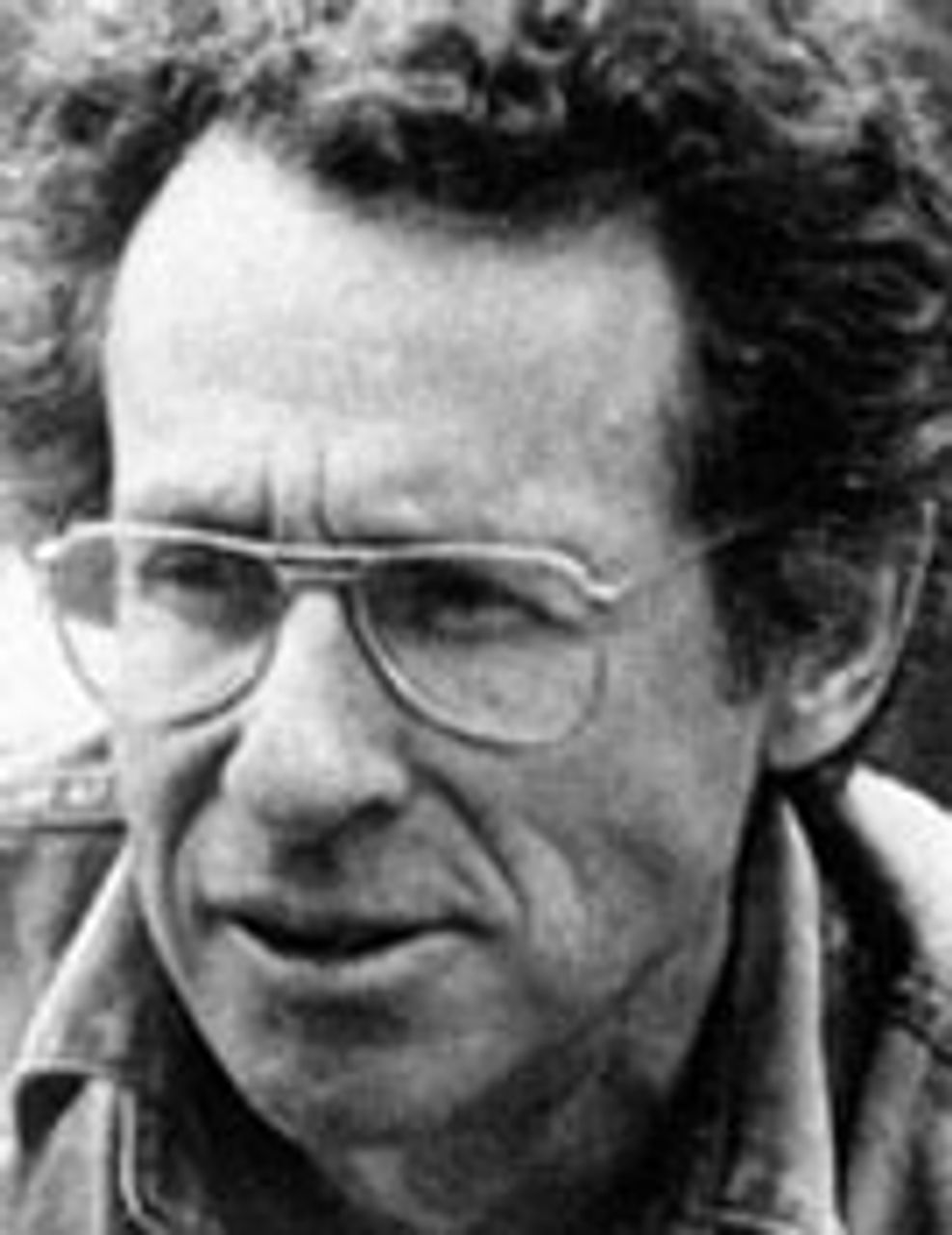 Arthur Penn
Arthur PennArthur Penn, one of the most sensitive and intelligent figures in American filmmaking in the 1960s and 1970s, died in New York City on September 28, a day after his 88th birthday. Penn is perhaps best known for The Miracle Worker (1962), Bonnie and Clyde (1967), Little Big Man (1970), Night Moves (1975) and The Missouri Breaks (1976).
In particular Penn worked effectively—in several cases, more than once—with many of the most interesting male performers of that period, including Marlon Brando, Jack Nicholson, Gene Hackman, Paul Newman, Warren Beatty, Robert Redford, and Dustin Hoffman. But one should not forget either his direction of Faye Dunaway, Anne Bancroft, Jane Fonda, Angie Dickinson, Janice Rule, Patty Duke, Melanie Griffith, and others.
Penn was born in 1922—to a watchmaker and a nurse—in Philadelphia, but split his time between that city and the New York City area after his parents’ divorce. His older brother was the famed photographer Irving Penn, who died in 2009. Arthur Penn became interested in the theater in high school and directed plays while in the army, which he joined in 1943. He saw action in the Ardennes and the Battle of the Bulge. The future director told an interviewer in 2008, “I was quite left politically all through World War II.”
After the war, on the G.I. Bill, Penn enrolled at Black Mountain College in North Carolina, a center for artists and others—including many European refugees from the Nazis—who considered themselves at odds with the mainstream culture. For example, Penn directed a production there with music by John Cage, choreography by Merce Cunningham, set design by Willem de Kooning and featuring Buckminster Fuller.
Penn began his professional directing career in live television in the early 1950s, and also did work on Broadway. His first film, The Left Handed Gun (1958), was a highly personal retelling of the Billy the Kid story, loosely based on a script by Gore Vidal. It was a commercial failure, although well received in Europe. Penn gained wide recognition with The Miracle Worker in 1962, the deeply moving story of teacher Annie Sullivan (Bancroft) and the blind and deaf Helen Keller (Duke), which he had directed on the stage.
Mickey One (1965), a murky study of alienation and paranoia done in the fashion of the French New Wave (shot by Robert Bresson’s cinematographer), Penn’s initial film with Beatty, was greeted by studio executives with “Consternation. Total consternation,” in the director’s words. Working with Brando on The Chase (1966), about a small Texas town where hypocrisy, repression and racism dominate its respectable citizens, Penn made a film clearly influenced by the civil rights struggle, the Kennedy assassination and a general loathing for the official veneer of American society.
A commentator, Adam Bingham, sees “Penn’s forte as probing the workings of a capitalist society built on greed, power and with a latent violence barely (and never always) held in check.”
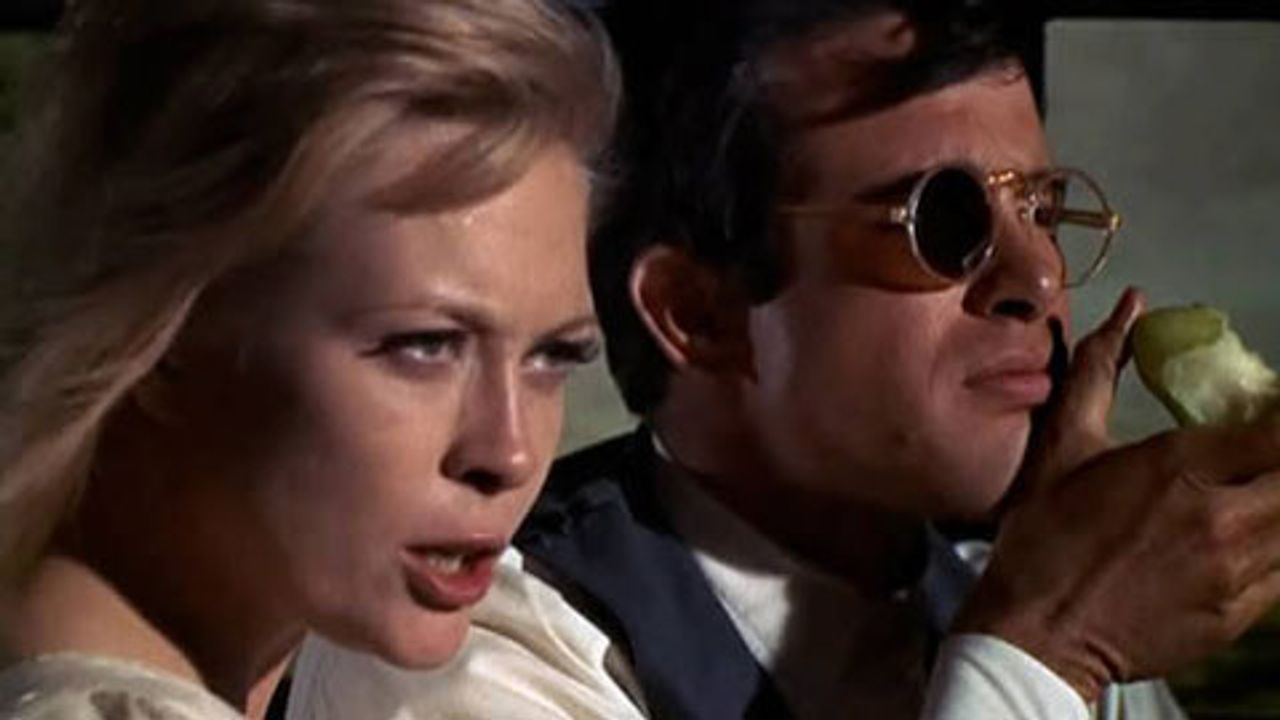 Bonnie and Clyde
Bonnie and ClydeBonnie and Clyde, released in 1967, made Penn very famous and much sought after. The film, about a pair of relatively obscure and “fairly squalid” (in Penn’s phrase) American criminals of the early 1930s, played by Beatty and Dunaway, touched a chord with the younger generation in particular. Its eclectic (and more or less simultaneous) mix of slapstick comedy, sexuality and startling violence—with jabs at the banks, the police and authority in general—was something new in American movies. Whether or not the work was true to its subjects and the Depression years, Bonnie and Clyde was certainly true to an anti-establishment mood beginning to take hold among American youth in the late 1960s.
Penn followed up that commercial success with Alice’s Restaurant (1969), whose starting point was the Arlo Guthrie “talking blues,” and featured Guthrie. The film treated the success and ultimate failure of the so-called counterculture. In Little Big Man, the director turned his attention to the fate of Native American people, “wiped out,” in his words to an interviewer, by the advance of American capitalism.
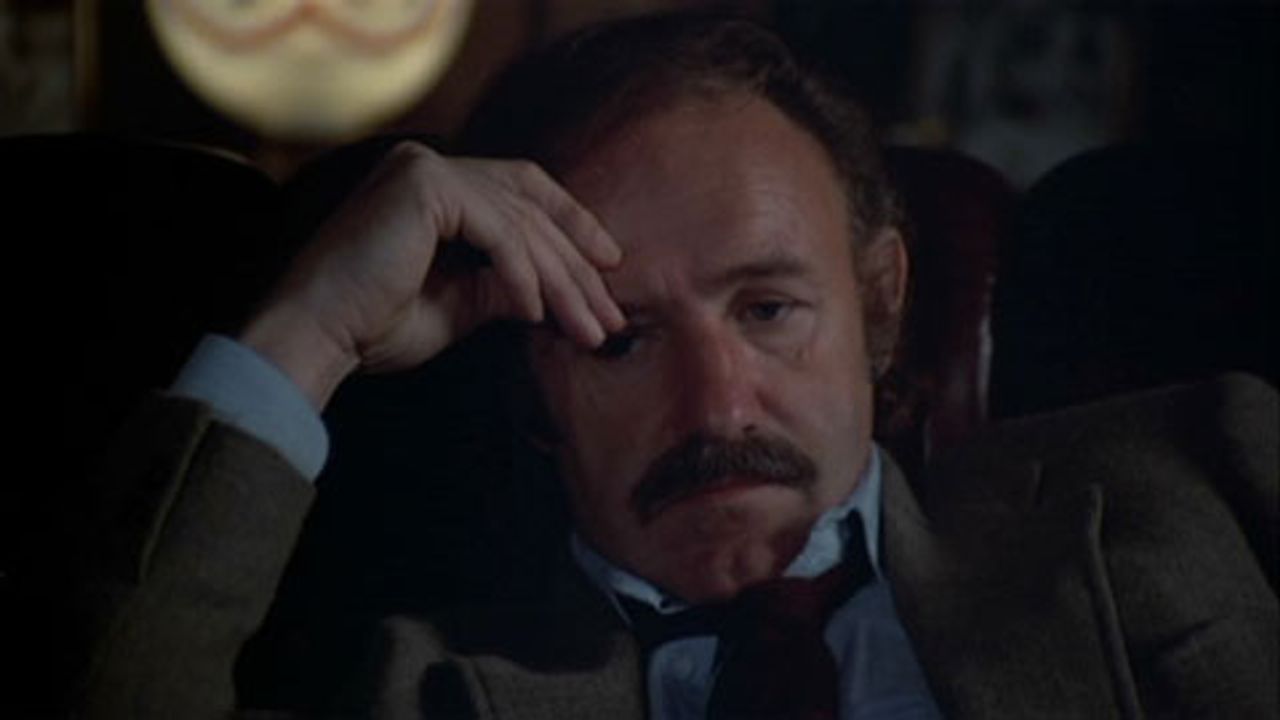 Night Moves
Night MovesNight Moves, Penn told another interviewer, expressed the “sourness” he felt about the assassinations of the Kennedy brothers—with whom he had worked—and Martin Luther King Jr., the sweeping victory of Richard Nixon in 1969, and the Watergate affair which ultimately brought Nixon down. Its protagonist (Hackman) is a private detective over his head in both his personal life and his attempts to solve a “mystery.”
Brando and Nicholson played together in The Missouri Breaks, another attempt to demystify a portion of American history. Set in the 1880s in Montana, the story concerns a horse thief (Nicholson) and the chameleon-like “regulator” (Brando) hired by a rancher to wipe him out.
In the last 35 years of his life, Penn directed a handful of films and television movies, while working more extensively in the theater. He told the Boston Globe in 2008, “I was out of fashion. … My time was over, unless I was willing to live out in Hollywood and keep trying to generate projects and keep trying to stay in the public eye. None of which I was willing to do.”
Penn was a critic of commercial filmmaking from the outset. Presciently, he told the French film magazine Cahiers du Cinéma in 1963, about Hollywood: “As far as I can see, the place is killing itself. Pretty soon it’ll be churning out only blockbusters and TV series. That’s all, no more actual films. Eventually the corporations turning out forty or fifty films a year will make only four or five.”
In an address to students at Dartmouth College in 1968, Penn disparaged the “structured clichés” accepted as the “norm” in studio films—“a norm,” he added, “that on the very first day I stepped onto a film set I found myself in opposition to.”
To an interviewer in 2004, Penn commented that the Hollywood studios had “become small parts of huge corporations, and all they are really interested in is showing a profit, and consequently, profit in their terms means a film which can play all around the world, which means, essentially, a film not being dialogue-dependent, and therefore, you get non-people, and that’s why we have things like Shrek [the animated film]—which is marvelous for what it is, but it tends to take the place of doing films. And I don't think many films of the future of any major significance are going to come out of there.” (Bright Lights Film Journal)
Penn emerged out of the broadly left-wing intelligentsia shaped in large measure by the Depression years and the Second World War. Explaining why he directed Little Big Man, Penn told the same interviewer that the immediate impetus had not been the Vietnam War as such, “although, when it comes to wars of genocide, or genocidal attempts, they tend to resemble each other. I was really, in my mind, carrying the Holocaust. You know? Because it was such indiscriminate killing, based on some kind of societal definition of humans who can be dispensed with. And that impulse, it’s happening today. It’s happening everywhere. It happened in the Second World War, it happened in Vietnam, it’s happening in Iraq, in war after war.”
He told interviewers in 2008, “I think that the myths about America have been certainly widespread about the wars in my time. I mean, Vietnam would be laughable if it weren’t so tragic. The Korean War was the illogical extension of the McCarthy terror, and so forth. So, I’ve always been suspicious of history and the way things are reported.” (Brooklyn Rail)
Penn told Bright Lights that the original story for Mickey One, which he and the writer restructured, “was applicable, in my view, to what was prevailing in the United States at that time [the early 1960s], which was the timidity that the McCarthy era had engendered, the sense of guilt and a sort of silence and evasion.” He explained on another occasion that the “McCarthy period was ridiculous and humiliating, deeply humiliating. When I finally did Mickey One, it was in repudiation of the kind of fear that overtook free people to the point where they were telling on each other and afraid to speak out. … I mean, I was a vet, so it was nothing like what we thought we were fighting for.” (Brooklyn Rail)
I met Arthur Penn in 1996 at the San Francisco Film Festival, where he received an award for his body of work, by which time he had been out of prominence in the film world for nearly two decades. He was gracious and serious-minded. In response to a question, he ascribed the decline in the quality of American films to the influence of money and big conglomerates.
Penn’s films stand up
The films that Penn directed stand up, by and large, when re-viewed. His concerns were real human concerns, not put on for show or to make a career for himself.
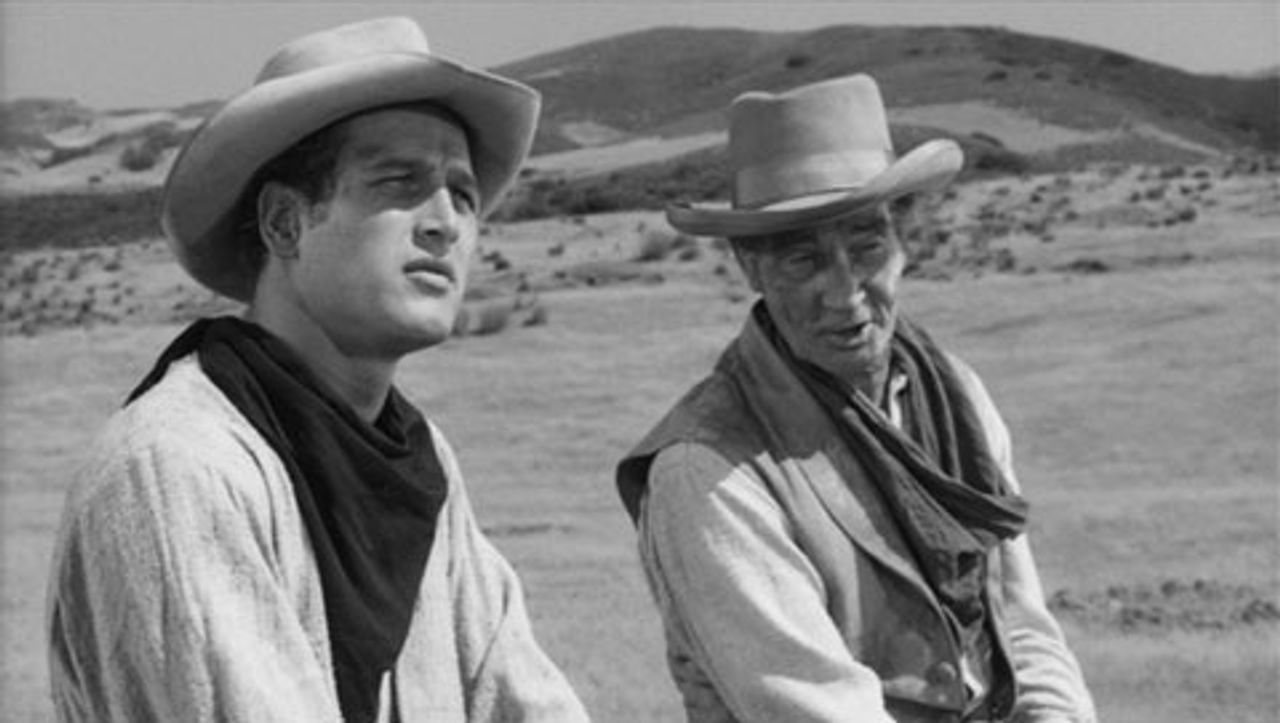 The Left Handed Gun
The Left Handed GunThe Left Handed Gun, for example, with Paul Newman as William Bonney, otherwise known as Billy the Kid, who got embroiled in the cattle wars in Lincoln County, New Mexico in the late 1870s. Penn’s focus is on Billy’s obsessive devotion to the man who has shown kindness to him, a surrogate father, an unreasoning devotion that leads to his own destruction.
Not for the last time, Penn seems disturbed by a perceived lack of maturity, a childishness in his lead character. Of course, he’s the “Kid,” but Newman was more than 30 years old at the time. Billy and his gang engage in horseplay (as will Clyde Barrow [Beatty] and his cohorts in Bonnie and Clyde, and Jack Nicholson’s horse thief and his gang in The Missouri Breaks), which seems both a nervous reaction to the adult pressures placed upon them and a sign of their unpreparedness for the dramas that their own actions have set in motion.
The volatile combination of naïveté and unpreparedness, interspersed with bouts of homicidal violence, is something that Penn apparently locates in a certain American (male) type. One wonders whether he first encountered ‘roughhousing’ and mindless emotional explosiveness in the US army during World War II and whether that encounter stayed with him his entire life.
This finds an even sharper expression in Bonnie and Clyde. That film, Penn’s greatest commercial success, is untypical in some ways of his work. The script, by David Newman and Robert Benton, which was first offered to French filmmaker François Truffaut, is more self-conscious and affected than most of the other screenplays he brought to the screen.
Still, the film has vivacious and extravagant elements, including a radiant Dunaway and an ebullient Hackman, that hold the spectator’s attention. The final slow-motion gunning down of the outlaws, a technique which Penn later noted became a “hopeless cliché,” was striking and disturbing in its day. Along with his other themes, almost in passing, Penn rendered judgment on the savage violence of the US authorities and their “law enforcement” agencies, a violence that far surpasses anything carried out by the rather hapless outlaws.
Once again, Penn’s studio was hostile to the film. “When we showed it [Bonnie and Clyde] to the head of distribution, he came out and he said: ‘This is a piece of shit.’”
It would be interesting to compare the more rebellious US films of the late 1960s and early 1970s, associated with the radicalism then emerging, with the poetic realism of the late 1940s—present in such works as They Live by Night, Gun Crazy, White Heat, and The Lady from Shanghai—the last phase in Hollywood’s development before the anti-communist purges. I think one would discover that the relative freedom in regard to sexuality and violence in the newer pictures was a gain, but that a sharper social focus and, above all, the serious presence of the working class and related economic questions had gone missing in American films (and remains missing), a consequence largely of the McCarthyite hysteria.
In any event, Penn made an effort to introduce the conditions of the Depression into Bonnie and Clyde, if only in bits and snatches. In one scene, a dispossessed farmer and his former hand take turns shooting holes in their old house and a bank sign. Penn told Bright Lights that the film was “really about … if the system is inimical to you, then you do whatever you can to alter your relationship to the system. In Bonnie and Clyde, it was a very simple event. The banks were foreclosing on these farms that had been afflicted by the dustbowl, and here were all these poor, and in numerous cases illiterate farmers, who were having their farms simply taken away. But then, nobody would farm that land, and so the banks were in effect doing what banks do, but not to anybody’s benefit.”
Another juxtaposition worth making would be between Penn’s films and those of his near contemporary, Robert Altman (1925-2006). One-to-one contrasts could be made between Penn’s Bonnie and Clyde and Altman’s Thieves Like Us, about another Depression-era criminal couple; between Little Big Man and Altman’s effort at demystification of the Old West, Buffalo Bill and the Indians; between Penn’s Night Moves and Altman’s The Long Goodbye; and perhaps between The Missouri Breaks and Altman’s McCabe and Mrs. Miller.
Both were iconoclastic and talented filmmakers, marked as well of course by the particular conditions of the postwar world, but one might suggest this difference: that Penn’s point of view was often that of the outsider, while Altman tended to treat the insider wondering how he could get out.
Night Moves (released in 1975) undoubtedly captures a certain dark and bewildered mood, as Penn himself noted. Along with Altman’s The Long Goodbye and Roman Polanski’s Chinatown, it is one of the most effective of the 1970s’ films at bringing up to date the Raymond Chandler-Dashiell Hammett-James M. Cain tradition, at the same time as it attempts to criticize or undermine that tradition.
Gene Hackman’s Harry Moseby is an anachronism, a private detective in Los Angeles working on his own, over the objections of his wife, who wants him to work for a large agency. To get away from his own problems as much as anything else, he takes on the case of a runaway girl and heads to the Florida Keys. A complicated set of events unfolds, whose central content is a conspiracy the dimensions of which Moseby only grasps when it is too late.
Night Moves conveys the sense that the surface of life is misleading, that powerful and deceitful forces are at work, that one’s ignorant blundering about is foreseen and even advances the plans of these very forces … All this speaks to the American psyche in the mid-1970s, as official politics was swinging sharply to the right, effected in part by political assassination, and occurring largely behind the backs of the population.
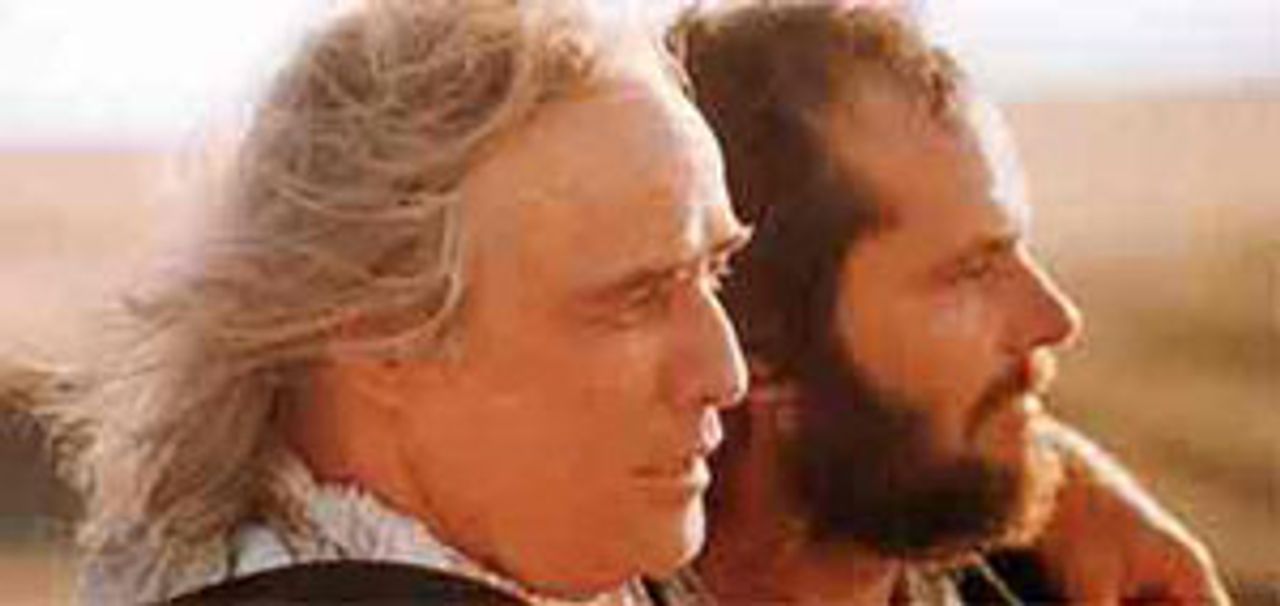 Missouri Breaks
Missouri BreaksPenn’s next movie, The Missouri Breaks, is not an entirely successful work, and perhaps shows signs of a diminution in the director’s own ability to make integral sense of the world and American life and history in particular. The film meanders and never quite reaches any particular destination. Nonetheless, it has fascinating and compelling elements. For one thing, Penn had the benefit of Jack Nicholson at the height of his acting powers, with all the precision and feeling the performer brought to films in the mid-1970s.
Reviewers were sharply critical of Brando, as the detective-hired killer, Lee Clayton, brought in to deal with Nicholson’s horse-thieving ring. That remarkable actor portrays Clayton one scene with an Irish brogue, another in drag, in still another he appears to woo his horse, and so forth. There was a method to the madness, however, as Penn explained: “So we [he and Brando] sat there talking about it, and essentially we said: this guy’s got to be different every time we see him. That’s his personality, that he’s ephemeral, that he’s chameleon-like and in permanent disguise. And that’s where we went from, so, finally, he ends up dressed as Granny.”
Although there are humorous and slightly bizarre results at times, the figure of the “regulator” is hardly a comic one. Clayton is a nasty piece of work, a cut-throat in the hire of the wealthy, and Brando is attempting to say something about such a type. (More than any other of his impersonations, Clayton reminds one of Brando’s treacherous Sir William Walker in Burn! [1969], a 19th-century agent provocateur and mercenary who incites a Caribbean island slave rebellion and later helps suppress it, all in the service of British sugar interests.)
In sum, Arthur Penn’s films are well worth viewing. He brought a rare intelligence and degree of insight to his work.
